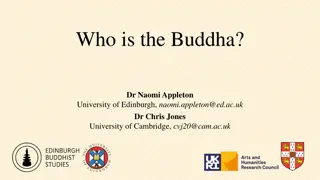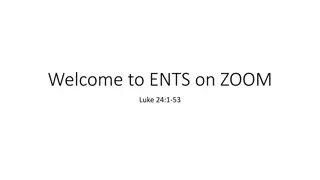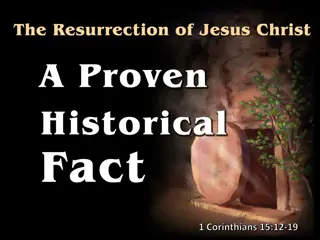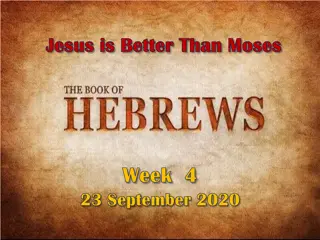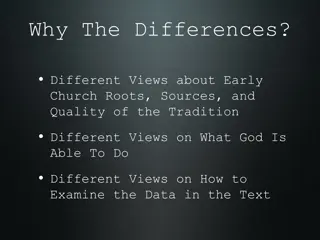
Historical Evidence and Sources on Jesus: A Critical Analysis
Explore the historical evidence surrounding Jesus, including independent sources, main narratives, and key figures like Pontius Pilate and Tiberius Caesar. Delve into the credibility of the Jesus story from various perspectives, highlighting the significance of non-Biblical references. Discover how scholars, believers, and skeptics approach the study of Jesus's existence and impact on history.
Download Presentation

Please find below an Image/Link to download the presentation.
The content on the website is provided AS IS for your information and personal use only. It may not be sold, licensed, or shared on other websites without obtaining consent from the author. If you encounter any issues during the download, it is possible that the publisher has removed the file from their server.
You are allowed to download the files provided on this website for personal or commercial use, subject to the condition that they are used lawfully. All files are the property of their respective owners.
The content on the website is provided AS IS for your information and personal use only. It may not be sold, licensed, or shared on other websites without obtaining consent from the author.
E N D
Presentation Transcript
Huge area of study for both Christians and non-Christians. Atheists trying to disprove the Bible (10%) Mainstream Historical Scholarship (80%) Christians trying to prove the Bible (10%) General agreement that at least the main parts of the Jesus story are credible. Gospels treated as legitimate historical texts biased, but so is everything.
Between five and seven independent sources on Jesus in the New Testament. John written independently of Matthew/Mark/Luke. Luke and Matthew written independently of each other. James written independently of any of the gospels. Eleven extra-biblical references to Jesus, three significant. By historical standards, this is a lot.
Without picking up a Bible, we know: Jesus lived in Israel during the reign of Tiberias Caesar. Jesus came from a Jewish village. Jesus gathered disciples from many nations. Jesus became famous as a teacher and a supposed worker of miracles. Jesus was crucified by Pontius Pilate, the Roman procurator, on the eve of the Passover festival. Even after his death, Jesus followers did not abandoned him they claimed he had risen from the dead. https://publicchristianity.org/library/beyond-doubt- evidence-for-jesus-existence#.UgMhptJgfX4
Sources about Jesus: Earliest sources written within 20 years. Latest NT source on Jesus (John) written within 60 years. Sources about other historical figures: Mohammed 125 years, single source. Alexander the Great best source written 400 years later. Tiberias Caesar best source written 80 years later. These are all normal figures.
Stuff the writers wouldnt make up because it hurts their case: The behaviour of the disciples. The crucifixion. The women at the tomb.
In the fifteenth year of the reign of Tiberius Caesar when Pontius Pilate was governor of Judea, Herod tetrarch of Galilee, his brother Philip tetrarch of Iturea and Traconitis, and Lysanias tetrarch of Abilene during the high-priesthood of Annas and Caiaphas, the word of God came to John son of Zechariah in the wilderness. Luke 3:1-2 Are these people real? Use Google to see what you can find out about each of the people listed above.
Annas & Caiaphas (High Priests) Herod Antipas (Ruler in Galilee) Zealots Essenes & Pharisees Herod the Great ( King of Israel) Tiberius Caesar (Emperor of Rome) (Emperor of Rome) Caesar Augustus Pontius Pilate (Ruler in Judea/Jerusalem) (Ruler in Judea/Jerusalem) Herod Archelaus Baptists [...also Philip & Lysanias]
There are a number of historical sources outside of the Bible that make reference to Jesus.
The only two events subject to "almost universal assent" are that Jesus was baptized by John the Baptist and was crucified by the order of the Roman Prefect Pontius Pilate. There are many sources that provide information about other aspects of Jesus life and death. These sources have been evaluated by different historians in different ways. This is very normal. The following slides contain some examples.
Tacitus is regarded as one of the most useful and reliable historians of ancient Rome. He writes about Emperor Nero s blaming of the Christians for the great fire of Rome: Therefore to scotch the rumour, Nero substituted as culprits and punished with the utmost refinements of cruelty, a class of men loathed for their vices whom the crowd styled Christians. Christus, from whom they got their name, had been executed by sentence of procurator Pontius Pilate when Tiberius was emperor; and the pernicious superstition was checked for a short time, only to break out afresh, not only in Judea, the home of the plague, but in Rome itself, where all the horrible and shameful things in the world collect and find a home.
Josephus is a major historian of this period. He writes: Now, there was about this time Jesus, a wise man, for he was a doer of surprising deeds a teacher of such men as receive the truth with pleasure. He drew over to him both many of the Jews, and many of the gentiles and when Pilate, at the suggestion of the principal men amongst us, had condemned him to the cross, those that loved him at the first did not forsake him, and the tribe of Christians, so named from him, are not extinct to this day. (Antiquities 18.63-64)
Later Josephus writes this: When, therefore, Ananus was of this disposition, he thought he had now a proper opportunity [to exercise his authority]. Festus was now dead, and Albinus was but upon the road; so he assembled the sanhedrim of judges, and brought before them the brother of Jesus, who was called Christ, whose name was James, and some others, [or, some of his companions]; and when he had formed an accusation against them as breakers of the law, he delivered them to be stoned: (Antiquities 20.200)
The following events are generally accept as things we can know about Jesus based on available sources. Unlike Jesus baptism and crucifixion these events do not have almost universal assent but they have strong support from the available sources. 1. Jesus was probably born in Bethlehem 2. Paternity possibly mysterious 3. Linked to the House of David 4. Brought up in Nazareth, in Galilee 5. Born, raised, lived, died a Jew 6. Became associated in some way with John the Baptist
7. Jesus began a ministry of his own 8. His ministry involved proclaiming the coming of God s kingdom 9. At or around the time of Passover Jesus went to Jerusalem 10. Jesus causes a disturbance in the Temple 11. Jesus is arrested and handed over to the Romans 12. Jesus is executed by the Romans and buried




